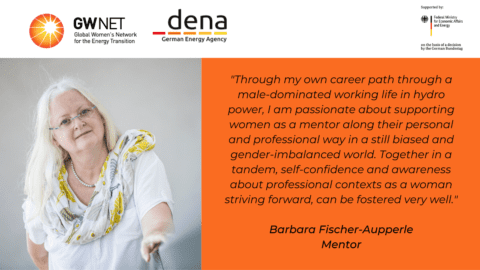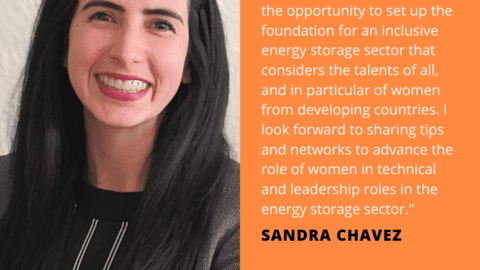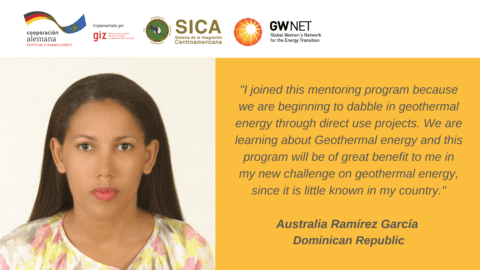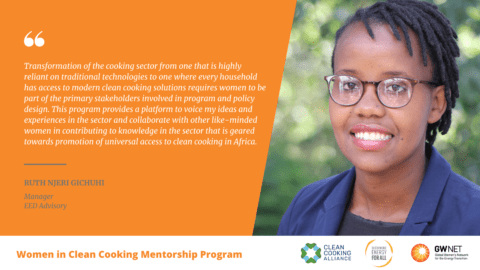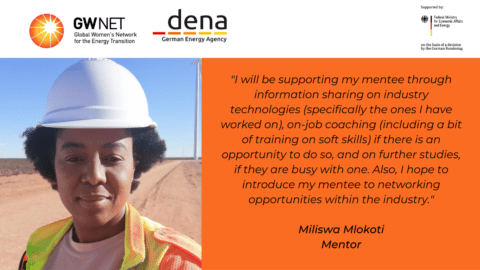The Women in Energy Storage Mentoring Programme sat down with Ukeme Asuquo, one of this year’s participants, to chat about her journey in renewable energy and the challenges and opportunities for women in the energy storage sector.
1) Tell us a little about yourself. What do you love most about what you do?
I began my career as a trainee engineer, where I learnt diverse skills. I have always been passionate about bringing people together and making a positive impact. My experience in successfully leading the team and a keen interest in hands-on activities led me to consider a course in engineering, and I have been building a career in renewable energy for the last four years.
Through the experience acquired, I have carried out technical operations and managed some sustainable energy projects. As a member of the engineering team, we collaborate to put smiles on the faces of people in the unserved and underserved communities through the deployment of hybrid solar projects. The projects are a life-changing event because this high positive impact project has not only increased economic productivity but has also improved standards of living, access to quality healthcare and education. I have been enjoying that part of my work, and I’m committed to bringing in the experience gained to solve problems; foster progress towards achieving the sustainable development goals and making the earth better than we first met it.
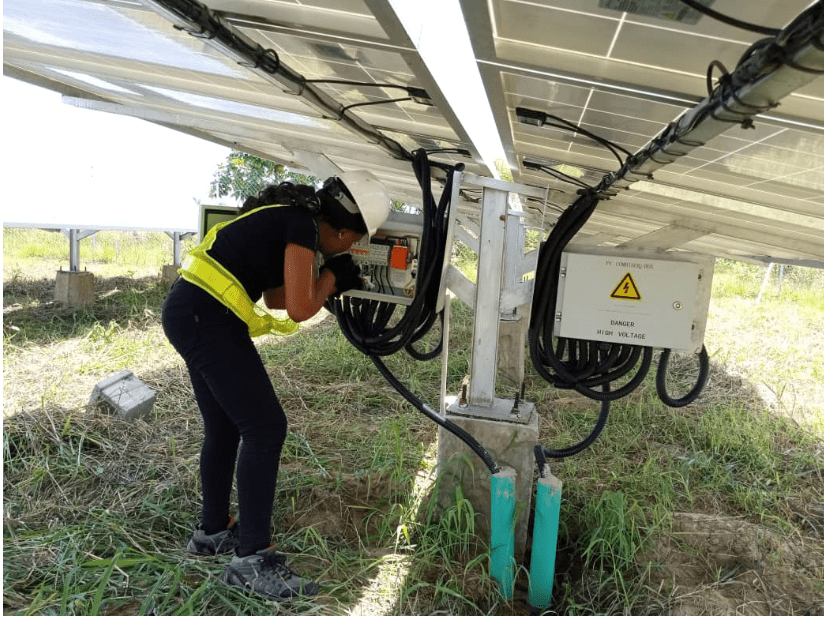 2) What were your goals when you started working in energy storage? Have these evolved?
2) What were your goals when you started working in energy storage? Have these evolved?
My goal when I started working in the energy storage was to participate actively in a sustainable energy project. Over time, I made rural electrification projects my focus. Since the energy storage industry is evolving rapidly, more skills are required, this drives my zeal towards personal development in other areas beyond technical skills to be able to maximize the opportunities within the industry.
However, there is a need to have visible female leaders as a source of inspiration to other STEM women. Thus, it spurred me to take action in building capacity for an effective knowledge and skill transfer.
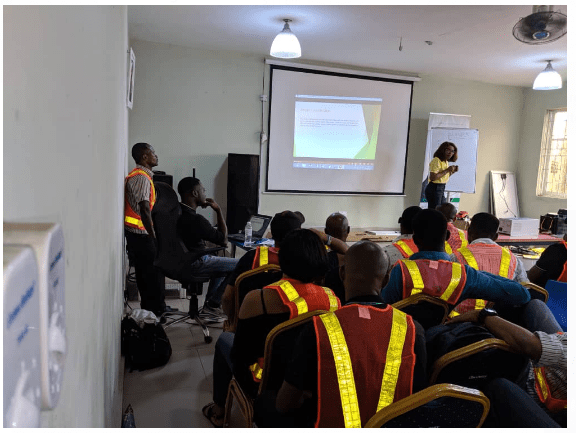
3) How have you adapted to the challenges caused by the COVID-19 pandemic and what advice would you give someone going through similar challenges?
With the ripple effect of COVID-19 being felt around the world, a lot has changed within every aspect of my life, which includes education, finance and business, among other things.
Most importantly, it has revolutionized the way I deal with situations of life. I have learnt to live life in the moment every day, set realistic goals and be more flexible in adapting to new changes irrespective of how it comes. For example, I have leveraged on the free online webinars/training since there is limited access to face to face training as planned before the outbreak of the COVID-19 pandemic. I have learnt to prioritize my needs while doing budgets and be prudent in my spending.
The truth is, we all have challenges but how you react to these challenges is what defines you. Challenges are not crutches but stepping stones, so do not focus on them. This pandemic shall pass away, but in the meantime, stay positive and have an open mind to learning new strategies of doing business and solving problems in your environment while striving in this period.
4) What are the opportunities for energy storage growth in your country?
Nigeria is the seventh most populous nation in the world with a population of over 170 million in 2013, according to the National population commission. Nigeria was considered one of the top investment nations and growth destinations by the global audit, finance and tax advisory firm KPMG in 2013.
My country is blessed with renewable energy resources such as solar, wind and water. However, the challenge is that these abundant resources have not been exploited fully even though the renewable sources have the capacity of changing the level of power generation and power consumption in Nigeria. Currently, the major sources of electricity in Nigeria are gas and hydropower, and Nigeria generation fluctuates between 3000 MW and 6000MW for a population of over 170 million as at 2020 compared to other nations such as South Africa (44,000 MW, 51 million) and Libya (6000 MW, 6million).
Therefore, Nigerian homes and business are facing enormous challenges when it comes to accessing electricity, and only 40 % of the population is in this group that have access to electricity. In order to improve the power generation to meet the demand from the Nigerian populace, there is a need for multiple sources of power generation. The quick answer is the energy mix that opens an opportunity for investors to tap into the abundant renewable energy sources. Thus, USAID has committed a grant of $767,512 for Nigeria’s development of renewable energy, and some other grants are available in recent years for Nigeria.
With this information and many more about the energy mix in Nigeria, there is a great opportunity for the energy storage sector in Nigeria.
5) What challenges have you faced in the sector? Can you tell us how you overcame (or are overcoming) this challenge(s)?
The energy value chain is largely gender- blind. I have experienced gender bias and restricted access to opportunities unlike my male counterparts in the sector. Although the energy storage industry is largely dominated by men, there is demand at all times on women to prove themselves.
However, I have been able to overcome these challenges at my workplace through dialogue and personal development, by studying, acquiring different skillsets and attending seminars/pieces of training relevant to my profession. I have also strived to increase my participation in energy storage projects and other SDG projects.
6) Why did you join the Women in Energy Storage Mentorship Programme? What do you hope to achieve?
My goals for joining the mentoring programme are to learn new skills and improve; network with people of diverse backgrounds and be empowered to mentor and help other women to choose, persist and succeed in STEM programs and careers.
I have a keen interest in energy storage because energy storage which is an integral part of the electricity supply, transmission and distribution systems, can provide a rich spectrum of benefits to the electric grid operations/infrastructure, to renewables integration, to electricity end-users and the society as a whole.
The energy storage industry has continued to evolve, adapt and innovate in response to changing energy requirements and advances in technology. I look forward to acquiring relevant and transferrable skills to successfully develop, construct and operate large-scale energy storage projects that promote a clean energy economy.
7) What advice would you give to women hoping to join the energy storage sector?
In developing countries such as Nigeria, the energy storage sector is still growing, and there is a need for professional hands to grow the sector. For a woman hoping to join the sector, I will advise her to be ready to expect some gender bias and possible challenges with work-life balance, but she should not be discouraged. Whatever challenges she faces should make her better and rise to be a model for other women and create an atmosphere to change the narrative about women in the sector. She should stay positive always, be intentional about her growth and have the grit to succeed no matter the challenges.
Read more about GWNET’s mentoring programmes here.


